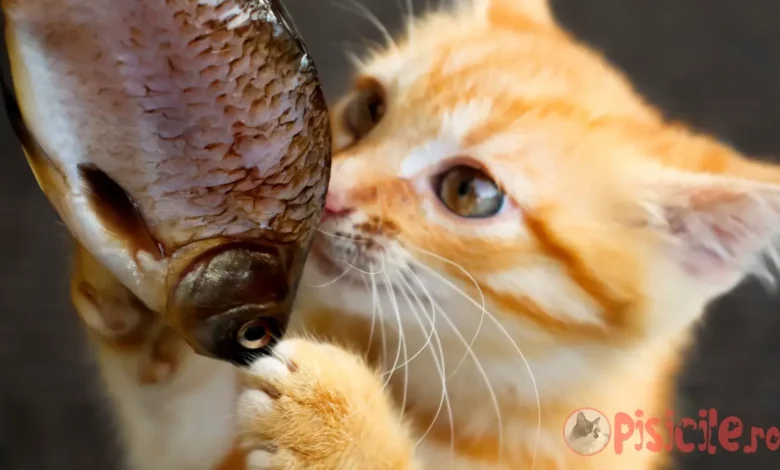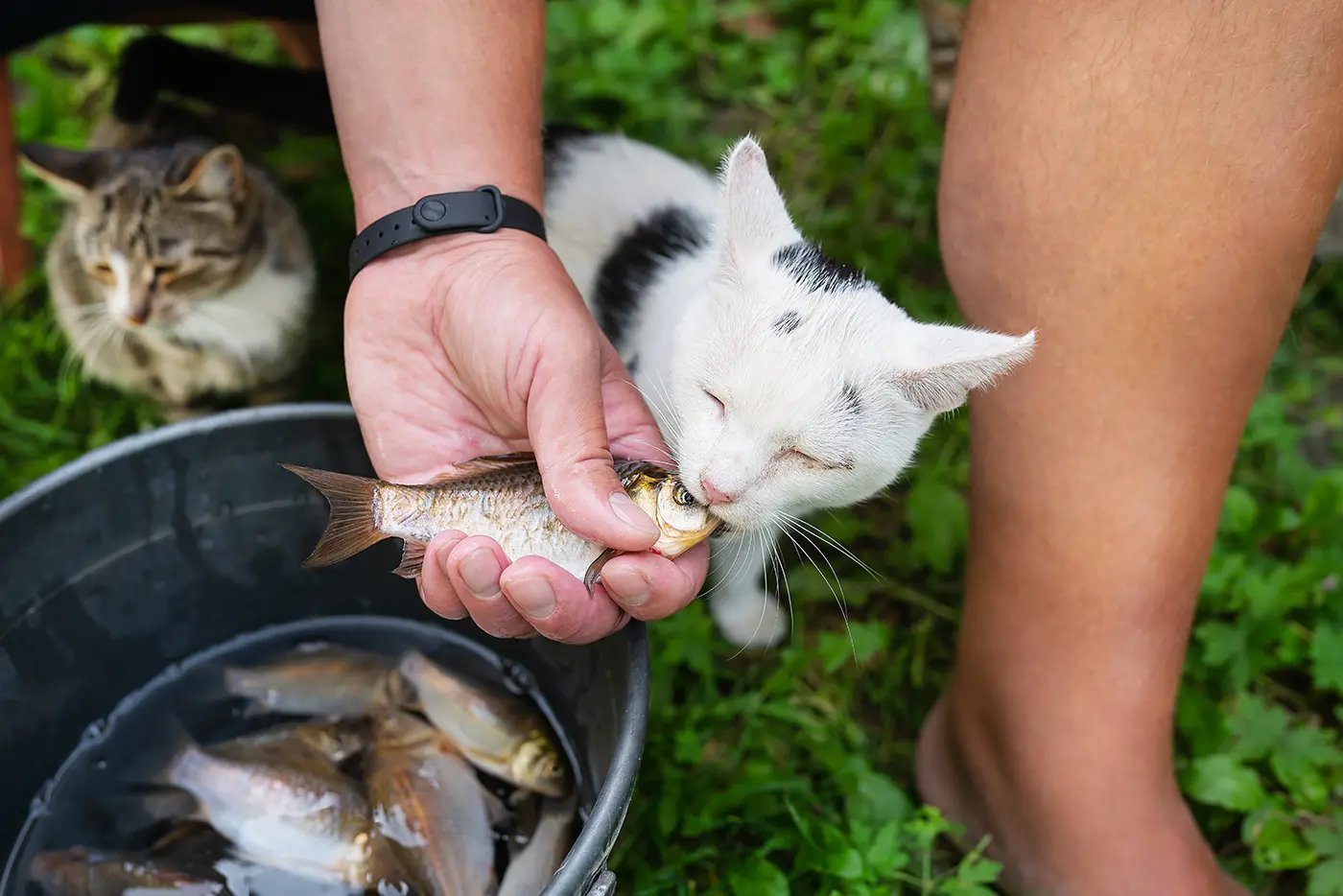
Cats are often associated with the image of fresh fish, and this is not accidental. They are carnivorous animals, and fish in a cat's diet can be an important source of nutrients. Cats know this very well and never miss a meal containing fresh fish. In the fishing villages or on the beaches where the boats full of fish for cherhanale dock, their presence is easy to notice.
Rich in protein and omega-3 fatty acids, fish offers an irresistible taste for cats, but it is good to know how to properly integrate it into their diet. Not all fish species are suitable and an exclusively fish-based diet is not balanced.
Subject
Recommendations: Fish in Cat Food
If you want to give fish to your cat, you should know that not all types and species of fish are beneficial for her health. It is also recommended that the fish be prepared without salt, spices or oils.
White fish, recommended for cats.
Species such as cod, hake and perch are generally safer for cats. These types of fish have a low content of small bones, which makes them easier to eat, and a lower risk of mercury contamination.
Fatty fish, offered in moderation in cat food.
Salmon and tuna are excellent sources of Omega-3 fatty acids, beneficial for coat and joint health. However, tuna can accumulate significant amounts of mercury, and excessive consumption can lead to poisoning. It is advisable to offer this type of fish in moderation and preferably choose low-mercury options such as wild salmon.
Freshwater fish is not recommended raw for cats.
Although fish in a cat's diet can be beneficial, it is best for them to stay away from freshwater fish species. It is not recommended to be given to cats as it may contain parasites, bacteria or harmful substances from the environment. If you choose to offer freshwater fish, make sure it is well cooked to eliminate the risks.
Nutritional benefits: Fish in the Diet of Cats
Fish brings numerous benefits to cats when the recommendations are taken into account and provided correctly:
Omega-3 and Omega-6 fatty acids– Tuna, salmon or mackerel are rich in Omega-3, which contributes to the health of the cat's skin, fur and joints. Omega-6, present in some fish species, is important for the immune system. The cat can get these nutrients both from fish prepared at home and from fish-based food found in pet shops.
Quality proteins– Fish in the diet of cats provides an important intake of protein. Fish proteins are easy to digest and are very important for cats' muscles and energy.
Vitamins and minerals – Fish is a natural source of vitamin D, B12 and selenium, which support your cat's overall health.
Even though fish in a cat's diet brings many benefits, do not offer fish as a staple food, but rather as a periodic treat. Fish can be an occasional addition to your cat's diet, but should not form the basis of its diet. A balanced diet should include a variety of animal proteins (chicken, turkey, beef) and be supplemented with specific vegetables and grains for cats.
You may also be interested in: What are the benefits of fish oil in cat nutrition?
Disadvantages: Fish in Cat Food
Despite the advantages, eating too much fish or choosing the wrong species can cause problems for your cat.
Small bones can create serious problems. Some species of fish contain dangerous bones that can cause sores in the cat's mouth or even digestive blockages.
Mercury and other toxins present in fish. Tuna and large fish can accumulate mercury and other heavy metals that are harmful to your cat's health, especially if you offer these types of fish regularly.
Nutritional imbalance. A diet based exclusively on fish can lead to vitamin deficiencies, especially vitamin E, and can cause some diseases associated with this deficiency.
Allergic reactions to fish. Although it may seem strange, some cats can develop food allergies to certain types of fish. It is good to observe your cat's health after introducing a new species of fish into her diet.
Homemade fish or cat food from the pet shop?

When deciding how to include fish in your cat's diet, it's important to consider both the benefits and risks associated with each option. Both fish prepared at home and fish from pet shop food have a number of advantages and disadvantages.
Fish prepared in house.
Advantages: Preparation of fish at home gives you total control over the quality of ingredients. You choose the type of fish, the cooking method and you can avoid adding salt, spices or other harmful ingredients. The properly cooked fish (boiled, steam or baked) can be a healthy source of protein and fat for the cat. You can also adapt Recipe according to cat preferences tale.
disadvantage: Cooking at home takes time and lack of nutritional balance can be a problem. Fish alone does not provide all the vitamins and minerals your cat needs, and some mistakes (such as leftover bones or raw fish) can have serious consequences for your cat's health.
Fish in commercial cat food
Advantages: Commercial food, whether canned or kibble, is formulated to provide a balanced nutritional profile. Pet shop products usually contain fish combined with other ingredients essential for cat health, such as vitamins and minerals. They are convenient and safe, especially if you choose a trusted brand.
disadvantage: Not all products on the market are of the same quality. Some tins or kibbles may contain large amounts of additives, preservatives or inferior fish. It is highly recommended to read the label and make sure the product contains healthy ingredients without harmful additives.
If you decide to use mainly commercial food, choose products with natural ingredients, without grains and with a high content of animal protein.
A good solution would be to alternate between home-prepared fish and commercial feed. For example, you can prepare fish at home a few times a month and supplement the diet with commercial food the rest of the days.
Additional tips
Avoid canned fish for humans: This may contain salt, oils and additives (such as preservatives or spices) that are not suitable for cats and may affect their long-term health.
Beware of raw fish: Raw fish may contain bacteria (such as Salmonella or Listeria) or parasites that can cause serious illness in cats. Make sure any fish offered is well cooked.
Observe your cat's behavior: If after eating fish, the cat shows symptoms such as vomiting, diarrhea, lethargy or other signs of discomfort, consult a veterinarian immediately.
Avoid fried or smoked fish: Fish cooked by frying or smoking is usually too rich in unhealthy fats, salt and other spices that can be dangerous for the cat's health.
Control portions: Offer fish only occasionally as a supplement to the main diet to prevent nutritional imbalances or dependence on this food source.
Choose quality fish: Avoid fish from questionable sources or freshwater fish without being well cooked, as it may be contaminated with pollutants or parasites.
Test gradually: If you give your cat fish for the first time, gradually introduce it into the diet and watch for possible allergic or intolerance reactions.
Avoid small bones: Make sure that the fish offered is cleaned of bones, which can cause injuries or even blockages in the digestive tract.
Conclusion: Is fish good for cats?
Fish in a cat's diet can be an occasional delicacy, but it is important to choose the right type, prepare it correctly and give it in moderation. The best way to ensure optimal nutrition for your cat is to consult a veterinarian and feed it a high-quality commercial diet specially formulated for cats.



